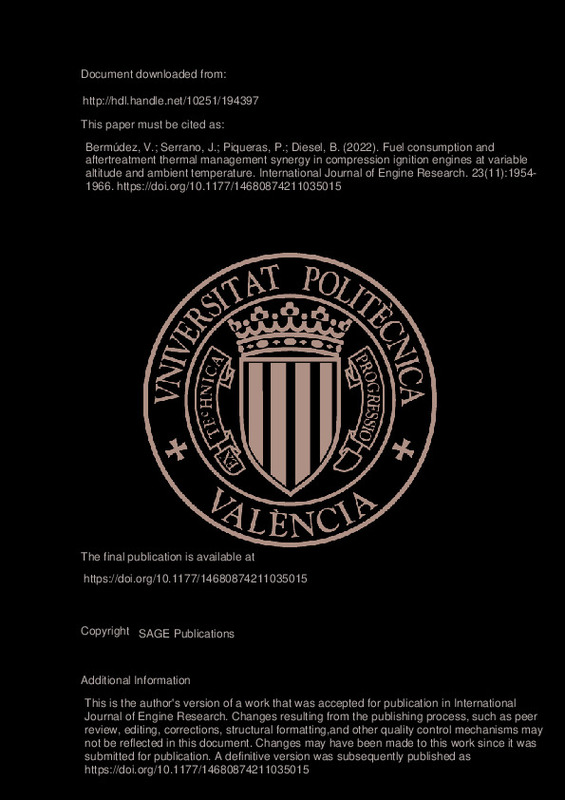JavaScript is disabled for your browser. Some features of this site may not work without it.
Buscar en RiuNet
Listar
Mi cuenta
Estadísticas
Ayuda RiuNet
Admin. UPV
Fuel consumption and aftertreatment thermal management synergy in compression ignition engines at variable altitude and ambient temperature
Mostrar el registro sencillo del ítem
Ficheros en el ítem
| dc.contributor.author | Bermúdez, Vicente
|
es_ES |
| dc.contributor.author | Serrano, J.R.
|
es_ES |
| dc.contributor.author | Piqueras, P.
|
es_ES |
| dc.contributor.author | Diesel, Bárbara
|
es_ES |
| dc.date.accessioned | 2023-06-19T18:01:29Z | |
| dc.date.available | 2023-06-19T18:01:29Z | |
| dc.date.issued | 2022-11 | es_ES |
| dc.identifier.issn | 1468-0874 | es_ES |
| dc.identifier.uri | http://hdl.handle.net/10251/194397 | |
| dc.description | This is the author's version of a work that was accepted for publication in International Journal of Engine Research. Changes resulting from the publishing process, such as peer review, editing, corrections, structural formatting,and other quality control mechanisms may not be reflected in this document. Changes may have been made to this work since it was submitted for publication. A definitive version was subsequently published as https://doi.org/10.1177/14680874211035015 | es_ES |
| dc.description.abstract | [EN] New regulations applied to the transportation sector are widening the operation range where the pollutant emissions are evaluated. Besides ambient temperature, the driving altitude is also considered to reduce the gap between regulated and real-life emissions. The altitude effect on the engine performance is usually overcome by acting on the turbocharger control. The traditional strategy assumes to keep (or even to increase) the boost pressure, that is, compressor pressure ratio increase, as the altitude is increased to offset the ambient density reduction, followed by the reduction of the exhaust gas recirculation to reach the targeted engine torque. However, this is done at the expense of an increase on fuel consumption and emissions. This work remarks experimentally the importance of a detailed understanding of the effects of the boost pressure and low-pressure exhaust gas recirculation (LP-EGR) settings when the engine runs low partial loads at different altitudes, accounting for extreme warm and cold ambient temperatures. The experimental results allow defining and justifying clear guidelines for an optimal engine calibration. Opposite to traditional strategies, a proper calibration of the boost pressure and LP-EGR enables reductions in specific fuel consumption along with the gas temperature increase at the exhaust aftertreatment system. | es_ES |
| dc.description.sponsorship | The author(s) disclosed receipt of the following financial support for the research, authorship, and/or publication of this article: This research has been partially supported by the Ministry of Science and Innovation from the Government of Spain through project PID2020-114289RB-I00. Additionally, the Ph.D. student Barbara Diesel has been funded by a grant from the Government of Generalitat Valenciana with reference ACIF/2018/109. | es_ES |
| dc.language | Inglés | es_ES |
| dc.publisher | SAGE Publications | es_ES |
| dc.relation.ispartof | International Journal of Engine Research | es_ES |
| dc.rights | Reserva de todos los derechos | es_ES |
| dc.subject | Internal combustion engine | es_ES |
| dc.subject | Altitude | es_ES |
| dc.subject | Ambient temperature | es_ES |
| dc.subject | Fuel consumption | es_ES |
| dc.subject | Thermal management | es_ES |
| dc.subject | Emissions | es_ES |
| dc.subject.classification | MAQUINAS Y MOTORES TERMICOS | es_ES |
| dc.title | Fuel consumption and aftertreatment thermal management synergy in compression ignition engines at variable altitude and ambient temperature | es_ES |
| dc.type | Artículo | es_ES |
| dc.identifier.doi | 10.1177/14680874211035015 | es_ES |
| dc.relation.projectID | info:eu-repo/grantAgreement/AEI/Plan Estatal de Investigación Científica y Técnica y de Innovación 2017-2020/PID2020-114289RB-I00/ES/INTEGRACION DE SISTEMAS DE POST-TRATAMIENTO DE GASES DE ESCAPE MULTIFUNCIONALES EN VEHICULOS DE PROPULSION HIBRIDA/ | es_ES |
| dc.relation.projectID | info:eu-repo/grantAgreement/GENERALITAT VALENCIANA//ACIF%2F2018%2F109//AYUDA PREDOCTORAL GVA-DIESEL COSTA/ | es_ES |
| dc.rights.accessRights | Abierto | es_ES |
| dc.contributor.affiliation | Universitat Politècnica de València. Escuela Técnica Superior de Ingeniería del Diseño - Escola Tècnica Superior d'Enginyeria del Disseny | es_ES |
| dc.description.bibliographicCitation | Bermúdez, V.; Serrano, J.; Piqueras, P.; Diesel, B. (2022). Fuel consumption and aftertreatment thermal management synergy in compression ignition engines at variable altitude and ambient temperature. International Journal of Engine Research. 23(11):1954-1966. https://doi.org/10.1177/14680874211035015 | es_ES |
| dc.description.accrualMethod | S | es_ES |
| dc.relation.publisherversion | https://doi.org/10.1177/14680874211035015 | es_ES |
| dc.description.upvformatpinicio | 1954 | es_ES |
| dc.description.upvformatpfin | 1966 | es_ES |
| dc.type.version | info:eu-repo/semantics/publishedVersion | es_ES |
| dc.description.volume | 23 | es_ES |
| dc.description.issue | 11 | es_ES |
| dc.relation.pasarela | S\458034 | es_ES |
| dc.contributor.funder | GENERALITAT VALENCIANA | es_ES |
| dc.contributor.funder | Agencia Estatal de Investigación | es_ES |







![[Cerrado]](/themes/UPV/images/candado.png)

